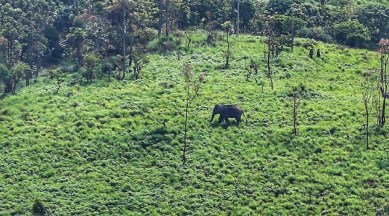Stay updated with the latest - Click here to follow us on Instagram
Tranquilisers, radio collars and four trained Kumkis: Arikomban’s first day in captivity
The first tranquilliser shot was fired at 11.55am but four more shots had to be fired later to sedate the animal, and the forest squad accompanied by four kumki elephants closed in on it.

Arikomban, the wild elephant that has been terrorising villages in Kerala’s Idukki district for many years now, was captured on Saturday after a day-long mission marked by repeated firing of tranquiliser shots at the tusker. Before it was herded into a fenced truck with the help of four kumki elephants – trained captive tuskers used to capture other animals – the defiant animal’s legs had to be tied with ropes, and eyes blinded by a cloth.
After being fixed with a radio collar, Arikomban was taken to Periyar Wildlife Sanctuary in Idukki amid a heavy escort of uniformed men, even as locals stood by the side of the road bidding a bittersweet goodbye to the rogue that menacingly roamed their lands and raided their homes and shops for several years.
The male elephant got the name Arikomban, which translates to ‘rice tusker’, because of its habit of raiding PDS (public distribution system) shops for rice and other food grains in villages of Chinnakanal and Santhanpara.
A team of forest officials, led by chief veterinary surgeon Dr Arun Zachariah, had launched the operation to capture the elusive elephant on Friday, but later suspended it as Arikomban did not show up on their radar.
On Saturday, hours after they resumed tracking the animal, officials spotted Arikomban at a tough, hilly terrain at Suryanelli village along with other tuskers. The first challenge was to move it to an open area, away from the herd. Officials burst explosives to scatter the elephants, and made Arikomban move to Cement Palam near Chinnakanal village area so they could sedate it.
The first tranquiliser shot was fired at 11.55 am, but barely had any effect. Later, four more shots were fired at the animal at regular intervals, before the forest squad closed in on it, accompanied by four kumki elephants. The team then tied its legs with tugs even as kumkis – the transformed rouges of yesteryears – stood watching and flapping their ears. A black cloth tied with a rope was raised in front of Arikomban’s head to blind it during the operation.
Later, a temporary road was made to bring the truck near the elephant. The four kumki elephants, which have participated in similar operations
in the past, pushed Arikomban using their heads and tusks. But Arikomban remained defiant, refusing to get into the truck. On a few occasions, the animal even turned against the kumkis, but eventually, around 5 pm, it fell in line and got caged in the truck.
Arikomban has, over the years, become a symbol of man-animal conflict, capturing the attention of not just irate locals but also the state government, the High Court and even the Supreme Court.
On March 25, as the forest department mobilised men and kumki elephants – trained captive tuskers used to capture other animals – to go after Arikomban, two animal rights organisations rushed to the High Court and obtained an interim stay. The forest department had planned to train Arikomban into another kumki, which has been the traditional practice.
The High Court then formed a five-member committee to examine the issue, which recommended that the elephant be captured, radio-collared and relocated.
The court decision sparked protests at villages in Parambikulam, with residents observing a hartal that was supported by all political parties.
Under pressure, the Kerala government moved the Supreme Court against the High Court’s direction, but the apex court refused to “interfere”.
“You have experts. Your experts have made a recommendation. The state government can’t now also sit and say it will do something over and above it,” said the three-judge bench presided by Chief Justice of India D Y Chandrachud and comprising Justices P S Narasimha and J B Pardiwala.
The villages at the centre of the conflict have been traditional settlements of the Muthuvan community, which used to coexist with wild animals. However, over the past two decades, increased settlements have also meant more human-animal conflict.
Over the years, the conflict has touched villagers of Tank Kudi, Chempakathozhukudi, Kozhipannakudi, Singukandam, BL Puram, Suryanelli, Panthadikalam, Chinnakanal and Poopara. And Arikomban, because of its love for rice and water, has emerged as the face of it all. Experts say another factor that made Arikomban roam this region is ready availability of water at nearby Anayirangal dam and the vast grassland.
Now believed to be aged around 30, Arikomban had repeatedly attacked PDS shops at Chinnakanal for rice.
The forest department also blames Arikomban for trampling seven persons to death, though locals argue this figure is 11. “Between 2005 and 2013, as many as 34 persons have been killed in elephant attacks in this region. Arikomban has been here for nearly 18 years,” said a forest official.
This is not the first time that the forest department has tried to capture Arikomban. In 2017, they had managed to fire tranquiliser shots at the animal, but it ran away.
Realising its weakness for rice, the forest department last month erected a dummy ration shop to lure the elephant and sedate it. However, it could not go ahead with the plan due to the interim stay issued by the High Court.
Finally, as part of the capturing exercise, the forest department, working with the Idukki district administration, conducted a mock drill on Thursday. Prohibitory orders were clamped in selected wards in Chinnakanal and Santhanpara, and a team of 150 officials drawn from various departments, along with four kumki elephants, were part of the exercise.